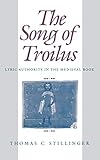The Song of Troilus : Lyric Authority in the Medieval Book / Thomas C. Stillinger.
Material type: TextSeries: The Middle Ages SeriesPublisher: Philadelphia : University of Pennsylvania Press, [2015]Copyright date: ©1993Description: 1 online resource (304 p.) : 2 illusContent type:
TextSeries: The Middle Ages SeriesPublisher: Philadelphia : University of Pennsylvania Press, [2015]Copyright date: ©1993Description: 1 online resource (304 p.) : 2 illusContent type: - 9780812231441
- 9781512809442
- 821/.1 20
- online - DeGruyter
- Issued also in print.
| Item type | Current library | Call number | URL | Status | Notes | Barcode | |
|---|---|---|---|---|---|---|---|
 eBook
eBook
|
Biblioteca "Angelicum" Pont. Univ. S.Tommaso d'Aquino Nuvola online | online - DeGruyter (Browse shelf(Opens below)) | Online access | Not for loan (Accesso limitato) | Accesso per gli utenti autorizzati / Access for authorized users | (dgr)9781512809442 |
Frontmatter -- Contents -- Acknowledgments -- A Note on Texts and Translations -- Introduction "Of Making Many Books . . ." -- 1. Sacra Pagina -- 2. Dante's Divisions: Structures of Authority in the Vita Nuova -- 3. Dante's Divisions: The History of Division -- 4. The Form of Filostrato -- 5. The Form of Troilus: Boccaccio, Chaucer, and the Picture of History -- 6. Sailing to Charybdis: The Second Canticus Troili and the Contexts of Chaucer's Troilus -- Afterword. Looking Back -- Notes -- Bibliography -- Index -- Backmatter
restricted access online access with authorization star
http://purl.org/coar/access_right/c_16ec
The Song of Troilus traces the origins of modern authorship in the formal experimentation of medieval writers. Thomas C. Stillinger analyzes a sequence of narrative books that are in some way constructed around lyric poems: Dante's Vita Nuova, Bocaccio's Filostrato, and Chaucer's Troilus and Criseyde. The shared aim of these texts, he argues, is to imagine and achieve an unprecedented auctoritas: a "lyric authority" that combines the expressive subjectivity of courtly love poetry with the impersonal authority of Biblical commentary. Each of the three establishes its own formal and intertextual dynamics; in complex and unexpected ways, the hierarchies of Latin learning are charged with erotic force, allowing the creation of a new vernacular Book of Love.The Song of Troilus is a linked series of incisive close readings. Each chapter defines and investigates a range of philological, intertextual, and theoretical problems; in addition to explicating his three principal texts, Stillinger offers important insights into a range of medieval traditions, from Psalm commentary to Trojan historiography to Ricardian political satire. At the same time, The Song of Troilus is a sophisticated narrative of cultural change and a searching meditation on history, desire, and writing.The Song of Troilus is an original and highly readable study of three major medieval texts; it will be of compelling interest to students and scholars of medieval literature, and to all those exploring the history of authorship and the implications of literary form.
Issued also in print.
Mode of access: Internet via World Wide Web.
In English.
Description based on online resource; title from PDF title page (publisher's Web site, viewed 23. Jul 2020)


